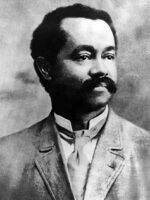Charles Henry Turner stands among the earliest African Americans to receive a Ph.D. from the University of Chicago. In 1892, he became the first Black scientist to have his work featured in Science, the esteemed journal of the American Association for the Advancement of Science.
Introduction
Turner’s importance lies in his groundbreaking contributions to our understanding of animal cognition, proving that insects and other arthropods exhibit complex behaviors indicative of learning, memory, and problem-solving abilities. At a time when the intellectual capabilities of such creatures were grossly underestimated, Turner’s meticulous research challenged prevailing scientific dogmas, paving the way for modern studies in animal behavior and psychology. Moreover, as one of the first African American scientists to gain recognition in the field of zoology, his perseverance and success in the face of racial discrimination serve as a profound inspiration. Turner not only expanded the boundaries of scientific knowledge but also broke significant societal barriers, making him a pivotal figure in both the history of science and the advancement of racial equality in academia. This blog post celebrates Turner’s top 10 contributions, underscoring his enduring influence on modern scientific research and his legacy as a resilient figure in the face of adversity.
Charles Henry Turner
- Birthplace and Early Life: Charles Henry Turner was born on February 3, 1867, in Cincinnati, Ohio. Growing up in a time of significant racial prejudice in the United States, Turner’s early interest in the natural world set the stage for his future contributions to science.
- Education and Academic Achievements: Turner was an exceptional student, completing his undergraduate and master’s degrees at the University of Cincinnati. He distinguished himself early on with his academic brilliance and research potential. In 1907, Turner earned his Ph.D. in Zoology from the University of Chicago, making him likely the first African American to receive a doctorate in this field from the university.
- Pioneering Research in Animal Cognition: Turner’s research fundamentally challenged the prevailing views of his time regarding animal intelligence. He was one of the first scientists to conduct systematic studies on the cognitive abilities of insects, demonstrating through ingenious experiments that creatures like bees, ants, and spiders possess complex behaviors indicative of learning, memory, and problem-solving capabilities.
- Overcoming Racial Barriers: Despite his significant academic and research achievements, Turner faced considerable racial discrimination throughout his career. This discrimination limited his opportunities in academia, particularly in securing a faculty position, which forced him to continue his research while working as a high school teacher.
- Legacy and Recognition: Charles Henry Turner’s work laid the groundwork for future studies in ethology, psychology, and neurology, significantly advancing our understanding of animal cognition. Though his contributions were not fully recognized during his lifetime, his legacy has grown over time, with renewed interest in his work shedding light on his pioneering contributions to the study of animal behavior and cognition.
Top 10 Contributions
- Early Advocate for Animal Intelligence: Charles Henry Turner was one of the first scientists to systematically study and argue for the complex cognition in animals, particularly in species considered unlikely to possess such abilities, as arthropods.
- Education and Early Barriers: Turner completed his undergraduate and master’s degrees at the University of Cincinnati, and later, he became likely the first Black scientist to earn a Ph.D. in zoology from the University of Chicago, despite facing significant racial barriers.
- Innovative Research Methods: He employed creative experimental designs to study animal behavior, such as constructing mazes for cockroaches and ants to navigate, which demonstrated their learning and memory capabilities.
- Study on Spiders: Turner’s studies on spiders challenged the prevailing belief that their web-building was purely instinctive, showing instead that spiders could adapt their web construction-in response to new environments, suggesting a form of intelligence and problem-solving.
- Ant Navigation Research: He discovered that ants do not rely solely on instinct but use a combination of cues and memory in navigation, a concept that was ahead of its time and anticipates modern research on animal cognition.
- Contribution to Bee Research: Turner demonstrated that bees rely on spatial landmarks for navigation, a finding similar to research published decades later by other scientists, highlighting his early insights into animal intelligence.
- Challenges of Racism: Despite his significant contributions, Turner’s work was largely unrecognized during his lifetime and after his death, partly due to the racial prejudices of the time that hindered his career advancement and recognition in the scientific community.
- Legacy in Education: Unable to secure a position at the University of Chicago due to racism, Turner took a position as a high school science teacher in St. Louis, where he continued his research and inspired future generations.
- Rediscovery and Recognition: In recent years, Turner’s work has gained recognition for its pioneering role in the study of animal cognition, with efforts to commemorate his contributions, such as proposals for a postage stamp in his honor.
- Influence on Modern Research: Turner’s early experiments and findings laid the groundwork for current research in animal cognition, demonstrating that many of his observations and conclusions were remarkably ahead of their time. His work is now seen as foundational in the fields of ethology and comparative psychology, illustrating the complex cognitive abilities of various animal species.
Conclusion
In conclusion, Charles Henry Turner’s life and work embody the quintessential qualities of perseverance, intellectual curiosity, and an unwavering commitment to scientific exploration. Born in an era marred by racial discrimination, Turner’s achievements in the face of such adversity not only showcase his resilience but also his profound contributions to the field of animal cognition. His pioneering research challenged the scientific norms of his time, laying the foundational stones for future studies on the complex behaviors and cognitive abilities of insects and other animals. Despite the obstacles he faced, Turner’s legacy as a scientist and educator continues to inspire current and future generations. His work serves as a powerful reminder of the importance of looking beyond surface appearances to uncover the rich tapestry of intelligence in the animal kingdom. Charles Henry Turner’s story is a testament to the enduring impact one individual can have on the advancement of knowledge and the pursuit of understanding in our complex world.


